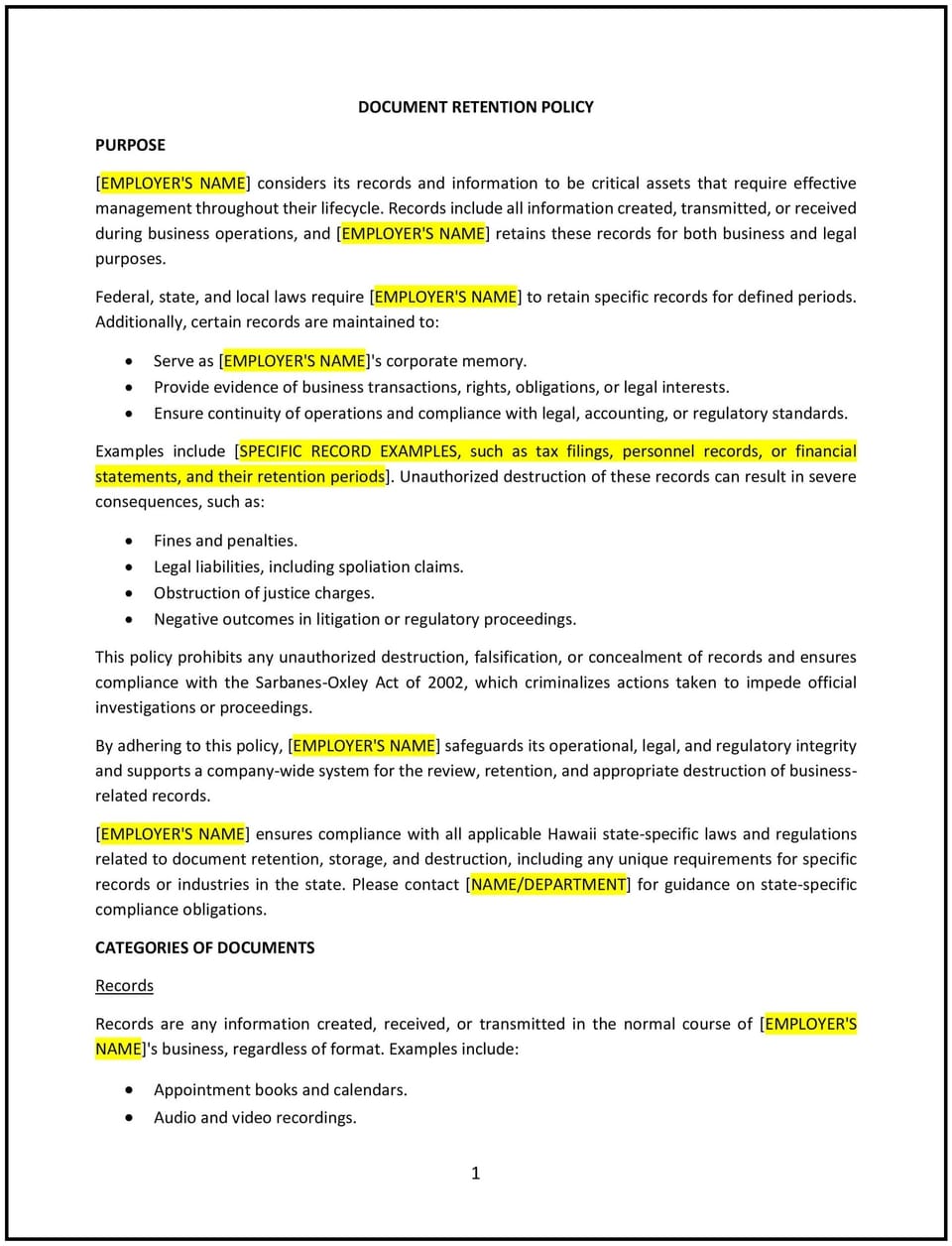Document retention policy (Hawaiʻi): Free template

Document retention policy (Hawaiʻi)
A document retention policy helps Hawaiʻi businesses establish guidelines for managing the storage, retention, and disposal of business records. This policy outlines procedures for organizing, safeguarding, and destroying documents in accordance with Hawaiʻi state laws and federal regulations. It is designed to protect sensitive information, reduce storage costs, and ensure the business can access important records when needed.
By implementing this policy, businesses in Hawaiʻi can maintain organized records, minimize legal and financial risks, and support efficient operations.
How to use this document retention policy (Hawaiʻi)
- Define document categories: Classify business records into categories, such as financial, legal, HR, and operational documents, and specify retention periods for each.
- Establish retention periods: Outline how long each type of document should be retained, based on Hawaiʻi state laws, federal regulations, and business needs.
- Create storage procedures: Provide guidelines for storing physical and digital documents securely, including access controls and backup systems.
- Outline disposal methods: Specify how documents should be destroyed when their retention period expires, such as shredding physical records or securely deleting digital files.
- Assign responsibilities: Designate roles for managing document retention, such as record custodians or department heads, to ensure accountability.
- Train employees: Educate staff on the policy’s guidelines, including how to store, retain, and dispose of documents properly.
- Monitor compliance: Regularly audit document management practices to ensure adherence to the policy and address any issues promptly.
- Communicate the policy: Share the policy with employees during onboarding and through internal communications to ensure awareness and understanding.
- Review and update the policy: Regularly assess the policy’s effectiveness and make adjustments as needed to reflect changes in laws, business needs, or technology.
Benefits of using this document retention policy (Hawaiʻi)
This policy offers several advantages for Hawaiʻi businesses:
- Protects sensitive information: Clear guidelines help safeguard confidential data from unauthorized access or breaches.
- Reduces storage costs: Regularly disposing of outdated documents minimizes physical and digital storage expenses.
- Supports legal and regulatory compliance: The policy helps businesses align with Hawaiʻi state laws and federal regulations regarding document retention.
- Improves efficiency: Organized records make it easier to locate and retrieve important documents when needed.
- Minimizes risks: Proper disposal of documents reduces the risk of sensitive information being misused or exposed.
- Enhances accountability: Employees understand their responsibilities for managing and disposing of documents appropriately.
- Supports disaster recovery: Secure storage and backup systems ensure critical records are protected in case of emergencies.
Tips for using this document retention policy (Hawaiʻi)
- Communicate the policy effectively: Share the policy with employees during onboarding and through regular reminders, such as emails or training sessions.
- Provide training: Educate staff on the policy’s guidelines, including how to store, retain, and dispose of documents properly.
- Use technology: Implement document management software to streamline storage, retention, and disposal processes.
- Monitor compliance: Regularly audit document management practices to ensure adherence to the policy and address any issues promptly.
- Be transparent: Clearly explain the policy’s purpose, benefits, and expectations to employees to build trust and cooperation.
- Review the policy periodically: Update the policy as needed to reflect changes in laws, business needs, or technology.
Q: Why should Hawaiʻi businesses adopt a document retention policy?
A: Businesses should adopt this policy to protect sensitive information, reduce storage costs, and ensure compliance with legal and regulatory requirements.
Q: What types of documents should be included in the policy?
A: The policy should cover all business records, including financial, legal, HR, and operational documents, with specific retention periods for each category.
Q: How long should businesses retain documents?
A: Retention periods should be based on Hawaiʻi state laws, federal regulations, and business needs, with clear guidelines for each document type.
Q: How should businesses store documents securely?
A: Businesses should use secure storage methods, such as locked filing cabinets for physical records and encrypted digital storage for electronic files.
Q: What methods should businesses use to dispose of documents?
A: Businesses should use secure disposal methods, such as shredding physical records or permanently deleting digital files, to prevent unauthorized access.
Q: What training should businesses provide to employees?
A: Businesses should educate staff on the policy’s guidelines, including how to store, retain, and dispose of documents properly.
Q: How often should the policy be reviewed?
A: The policy should be reviewed annually or as needed to reflect changes in laws, business needs, or technology.
This article contains general legal information and does not contain legal advice. Cobrief is not a law firm or a substitute for an attorney or law firm. The law is complex and changes often. For legal advice, please ask a lawyer.


